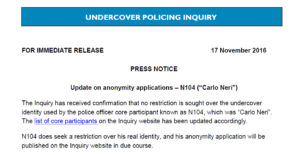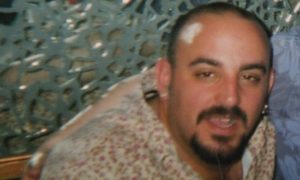Official: Marco Jacobs & Carlo Neri were Spycops

Is this the end of the Metropolitan Police stonewalling about the identity of spycops? Yesterday we got official confirmation of the identity of a fifth spycops officer, Carlo Neri, only days after we got the fourth, Marco Jacobs.
The announcements came from the Pitchford Inquiry into undercover policing, rather than the Met themselves, but it amounts to the same thing.
Although seventeen officers have been identified as belonging to the undercover political policing units, the Met have been at pains to ‘neither confirm nor deny’ (NCND) it.
This charade has continued long after several have been publicly outed with extensive details, including their real names, and been interviewed by the media. The Met even went as far as saying they ‘neither confirm nor deny’ that whistleblower officer Peter Francis was ever an officer.
The First Admitted Spycops
With Mark Kennedy, the Met had admitted he was an officer before the slew of exposures, so they hadn’t invented their supposed long-standing policy of NCND yet. They have, on occasion, done a merry dance to avoid naming him in court but it was too late to actively try any NCND nonsense.
Two years ago, after three years of obstructions, the courts finally forced the Met to admit that Bob Lambert and Jim Boyling had been in the Special Demonstration Squad.
Marco Jacobs & Carlo Neri

Carlo Neri
We’ve all known Marco Jacobs was a police officer since he was publicly exposed by those he targeted in South Wales five years ago.
In March 2015 the police struck a bizarre bargain, saying that whilst they wouldn’t openly admit Marco Jacobs was an officer, they wouldn’t contest anyone saying he was and they’d pay any damages due from his criminal abuse of people he spied on.
Carlo Neri infiltrated anti-racist and socialist groups in London in the early 2000s. He was exposed at the start of 2016. Andrea, who he deceived into a relationship, spoke to Newsnight about what she called the ‘psychological torture’ of being targeted.
Neither Neri nor Jacobs’ real names have been published. Yet other officers, such as John Dines and Mark Jenner, have been even more documented – and with their real names – but still the Met pretend they can’t confirm them. Earlier this year Dines uttered an apology to Helen Steel, who he had deceived into a relationship. What else was that but an admission of his role? How much longer can they keep stonewalling about these spycops?
The Met claim that the officers would be endangered. In the six years of exposure, including some of them being public and locatable, the worst harassment any has suffered is some polite leafleting outside a building Bob Lambert works in, which took place every few weeks on days when he wasn’t there.
Exposure is not a serious threat to their safety. It does not override the public’s right to know, nor the victims’ need for acknowledgement and closure.
The Met have spent sacks of public money sending in lawyers to obstruct the fight for justice. This week’s casual crumbling of NCND is proof it was never needed in the first place, that it was just a ruse which cruelly compounded the damage done to people abused by spycops.
‘The tactic of NCND has been wielded by the police in both court cases as a way of dragging out matters for five years, adding to the abuse and suffering already experienced by those targeted for relationships…
‘campaigners have been right in consistently pointing out that NCND is not a long standing policy that can never been breached, as the police claim, but something adopted when it suits them, namely when it comes to challenges over their accountability.’
Surely the police have to concede the truth about the rest of the seventeen. Everybody knows they were police officers. Their stories and faces have been online for years. Pretending it’s somehow secret is the act of an institution too petulant or paranoid to be taken seriously.
Release the Names
But it is not enough to merely tell us what we already know. We still don’t have any real details of how and why those people were sent into lives and campaigns.
Furthermore, the seventeen known officers are only a small fraction of the true total. Most of those abused by spycops cannot join the fight for justice because they have no clear idea what was done to them. Unless the cover names of the spycops are released people cannot realise what happened, come forward and tell their story. It also means that the officers’ evidence can’t be examined. If the names remain hidden in the Met and Pitchford’s files, we cannot get the whole truth.
The release of the cover names of officers and the groups they spied upon is the great test of the Pitchford inquiry. Truth is not just deserved by those who, through luck and persistence, have identified their state-sponsored abusers. It must be delivered to everyone subjected to this treatment, be they an individual, a campaign or an institution.
Beyond that, truth and justice are the right of the public who should know what has been done in their name, at their expense, to their society.

Yes, release the cover names (I am one of the Core Participants who has regularly picketed and leafleted re this). Problem is, in my years (and years) of activism I have almost never known anyone’s second name.